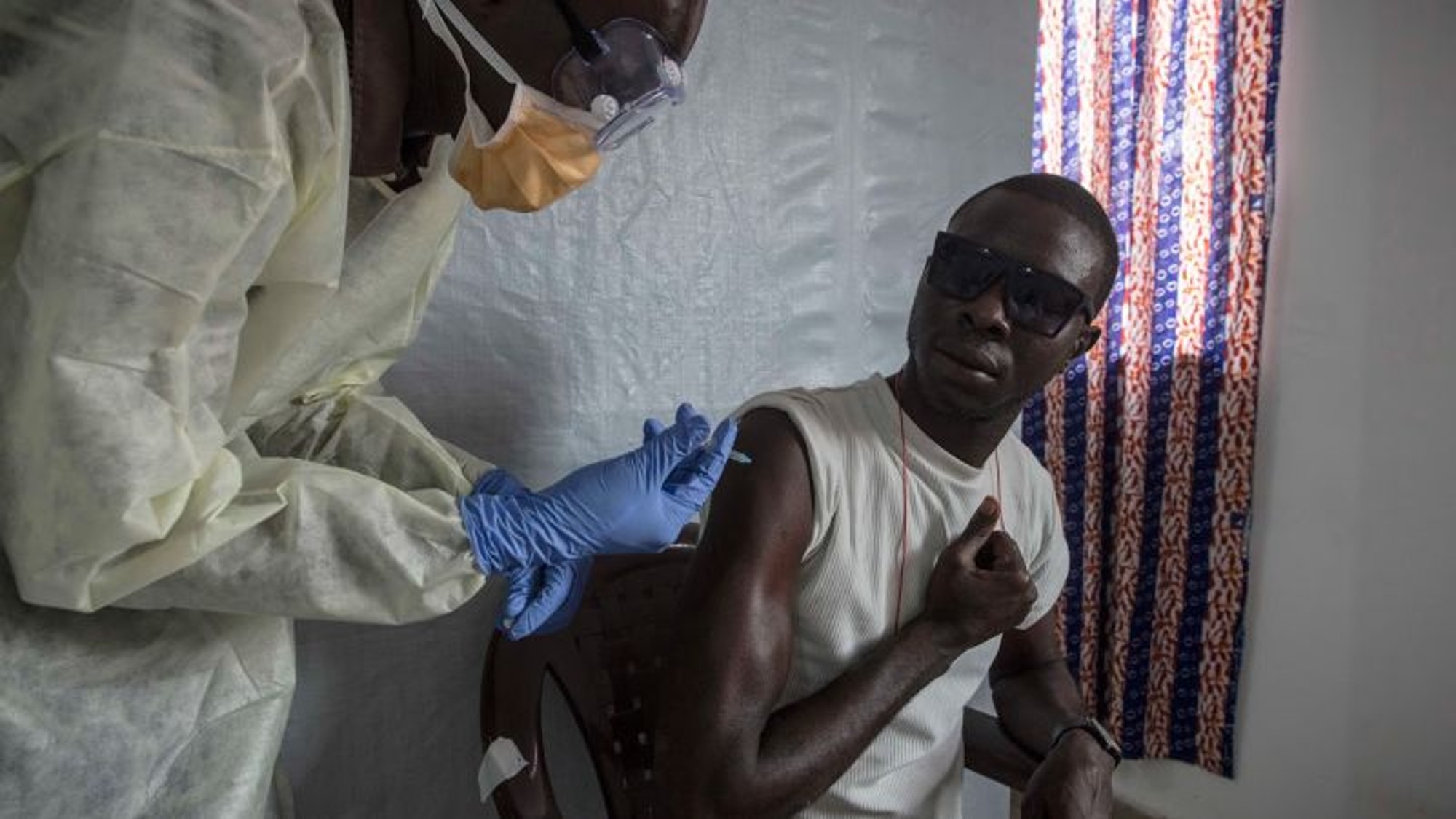Uganda records cases of a rare strain of Ebola 0:41
(CNN) --
Here's a look at key information about Ebola, a virus with a high mortality rate that was first identified in Africa in 1976.
What is Ebola and what are its symptoms?
Ebola hemorrhagic fever is a disease caused by one of five different Ebola viruses.
Four of the strains can cause serious disease in humans and animals.
The fifth, Reston virus, has caused disease in some animals, but not in humans.
The first human outbreaks occurred in 1976, one in northern Zaire (present-day Democratic Republic of the Congo), in central Africa, and the other in southern Sudan (present-day South Sudan).
The virus is named after the Ebola River, where it was first recognized in 1976, according to the Centers for Disease Control and Prevention (CDC).
Ebola is extremely infectious but not extremely contagious.
It is infectious because an infinitesimal amount of the virus can cause disease.
In this regard, laboratory experiments in non-human primates suggest that even a single virus may be enough to trigger a deadly infection.
Ebola is considered moderately contagious because the virus is not airborne.
advertising
Humans can be infected by other humans if they come into contact with bodily fluids from an infected person or contaminated objects from infected people.
Humans can also be exposed to the virus, for example by butchering infected animals.
Symptoms of Ebola are usually feeling weak, fever, aches, diarrhoea, vomiting and stomach pain.
Others are rashes, red eyes, chest pain, sore throat, difficulty breathing or swallowing, and bleeding (including internal).
Symptoms typically appear eight to 10 days after exposure to the virus, but the incubation period can last from two to 21 days.
Ebola is not transmissible if a person is asymptomatic and usually not after someone has recovered from the disease.
However, the virus has been found in the semen of men who have recovered from Ebola and could possibly be transmitted through contact with that semen.
There are five subspecies of Ebola virus: Zaire ebolavirus (EBOV), Bundibugyo ebolavirus (BDBV), Sudan ebolavirus (SUDV), Taï Forest ebolavirus (TAFV), and Reston ebolavirus (RESTV).
The devastating similarity of covid-19 with Ebola 1:16
West Africa outbreak 2014-2016
(Full historical timeline at bottom)
March 2014 -
The CDC issues an initial announcement about an outbreak in Guinea, and reports of cases in Liberia and Sierra Leone.
April 16, 2014 -
The New England Journal of Medicine publishes a report speculating that patient zero of the current outbreak was a two-year-old boy from Guinea.
The boy died on December 6, 2013, followed by his mother, sister and grandmother over the next month.
August 8, 2014 -
World Health Organization (WHO) experts declare the Ebola epidemic sweeping West Africa an international health emergency requiring a coordinated global approach, describing it as the worst outbreak in four decades of history. disease follow-up history.
August 19, 2014 -
Liberian President Ellen Johnson Sirleaf declares a nationwide curfew effective August 20, ordering two communities to be fully quarantined, with no entry or exit.
September 16, 2014 -
US President Barack Obama calls efforts to combat the Ebola outbreak centered in West Africa "the largest international response in CDC history."
In a speech from the CDC headquarters in Atlanta, Obama added that "in the face of this outbreak, the world expects" the United States to lead international efforts to combat the virus.
October 6, 2014 -
A nursing assistant in Spain becomes the first person known to have contracted Ebola outside of Africa in the current outbreak.
The woman helped treat two Spanish missionaries who had contracted Ebola in West Africa, one in Liberia and the other in Sierra Leone.
Both died after returning to Spain.
On October 19, Spain's Special Ebola Committee says nursing assistant Teresa Romero Ramos is considered free of the Ebola virus.
October 8, 2014 -
Thomas Eric Duncan, a Liberian national visiting the United States, dies of Ebola in Dallas.
Oct. 11, 2014 -
Nina Pham, a Dallas nurse who treated Duncan, tests positive for Ebola in a preliminary blood test.
She is the first person to contract Ebola on American soil.
Oct. 15, 2014 -
Amber Vinson, a second Dallas nurse who treated Duncan, is diagnosed with Ebola.
Authorities say Vinson flew on a commercial plane from Cleveland to Dallas days before he tested positive for Ebola.
Oct. 20, 2014 -
Under fire in the wake of two Dallas nurses' Ebola cases, the CDC releases updated Ebola guidance that stresses the importance of increased education and supervision, and recommends no skin exposure when workers wear personal protective equipment.
October 23, 2014 -
Craig Spencer, a 33-year-old doctor who just returned from Guinea, tests positive for Ebola, the first case of the deadly virus in New York and the fourth diagnosed in the United States.
October 24, 2014 -
In response to the Ebola case in New York, the governors of New York and New Jersey announce that their states are stepping up airport screenings beyond federal requirements for travelers from West Africa.
The new protocol requires the quarantine of anyone, including medical personnel, who has been in direct contact with people infected with Ebola during their stay in Liberia, Sierra Leone or Guinea.
The policy allows states to determine hospitalization or quarantine for up to 21 days for other travelers from affected countries.
January 18, 2015 -
Mali is declared Ebola-free after no new cases for 42 days.
February 22, 2015 -
Liberia reopens its land border crossings closed during the Ebola outbreak, and President Sirleaf also lifts the nationwide curfew imposed in August to help combat the virus.
May 9, 2015 -
WHO declares the end of the Ebola outbreak in Liberia.
More than 4,000 people died.
November 2015 -
The Liberian Ministry of Health says three new confirmed cases of Ebola have appeared in the country.
December 29, 2015 -
WHO declares Guinea free of Ebola after 42 days have passed since the last person confirmed to have the virus tested negative on a second test.
January 14, 2016 -
The UN issues a statement stating that "for the first time since this devastating outbreak began, all known chains of Ebola transmission in West Africa have been stopped and no new cases have been reported since late of November".
March 29, 2016 -
The WHO Director-General lifts the Public Health Emergency of International Concern related to the 2014-2016 Ebola outbreak in West Africa.
Chronology
This timeline includes information on the development of the virus, outbreaks with more than 100 deaths or special cases, and approved medications for prevention and treatment of symptoms.
1976 -
The first recognition of EBOV disease occurs in Zaire (now the Democratic Republic of the Congo).
In the outbreak, 318 human cases are recorded, resulting in 280 deaths.
An outbreak of SUDV also occurs in Sudan (present-day South Sudan), with 284 cases and 151 deaths.
1995 -
An outbreak in the Democratic Republic of the Congo (DRC) results in 315 reported cases and at least 250 deaths.
2000-2001 -
An outbreak in Uganda (SUDV) causes 425 human cases and 224 deaths.
December 2002-April 2003 -
An EBOV outbreak in the Democratic Republic of the Congo results in 143 reported cases and 128 deaths.
2007 -
An EBOV outbreak occurs in the DRC, with 187 of 264 reported cases fatal.
In late 2007, an outbreak in Uganda ends with 37 deaths out of a total of 149 reported cases.
September 30, 2014 -
CDC Director Dr. Thomas Frieden announces the first diagnosed case of Ebola in the United States.
The person has been hospitalized and isolated at Texas Health Presbyterian Hospital in Dallas since September 28.
July 31, 2015 -
The CDC announces that a newly developed Ebola vaccine is "highly effective" and could help prevent its spread in the current and future outbreaks.
December 22, 2016 -
The British medical journal The Lancet publishes an article about a new Ebola vaccine that was found to be 100% effective during drug trials.
The study was conducted in Guinea with more than 11,000 people.
August 1, 2018 -
The DRC Ministry of Health declares an outbreak of the Ebola virus in five health zones in North Kivu province and one health zone in Ituri province.
On July 17, 2019, the WHO announces that the outbreak constitutes a public health emergency of international concern.
On June 25, 2020, the DRC announces that the outbreak has officially ended.
A total of 3,481 cases are reported, including 2,299 deaths and 1,162 survivors.
August 12, 2019 -
Two new Ebola treatments are so effective that they are being offered to all patients in the DRC.
Initial results found that 499 patients who received the two drugs had an increased chance of survival: the mortality rate for REGN-EB3 and mAb114 was 29% and 34%, respectively.
The two drugs worked even better for patients who received early treatment: The death rate dropped to 6% for REGN-EB3 and 11% for mAb114, according to Anthony Fauci, director of the National Institute of Allergy and Infectious Diseases and one of the investigators who conducted the trial.
December 19, 2019 -
The US Food and Drug Administration announces approval of a vaccine to prevent the Ebola virus for the first time in the United States.
The vaccine, Ervebo, was developed by Merck and protects against Ebola virus disease caused by Zairean ebolavirus in people 18 years of age and older.
October 14, 2020 -
Inmazeb (REGN-EB3), a mixture of three monoclonal antibodies, becomes the first FDA-approved treatment for the Ebola virus.
In December, the FDA approves a second treatment, Ebanga (mAb114).
September 20, 2022 -
Uganda declares an Ebola outbreak after a case of the relatively rare Sudanese strain is confirmed in the country.
The WHO Africa office says the case was confirmed after testing a sample from a 24-year-old man from the country's Mubende district who died after showing symptoms.










/cloudfront-eu-central-1.images.arcpublishing.com/prisa/KMEYMJKESBAZBE4MRBAM4TGHIQ.jpg)



